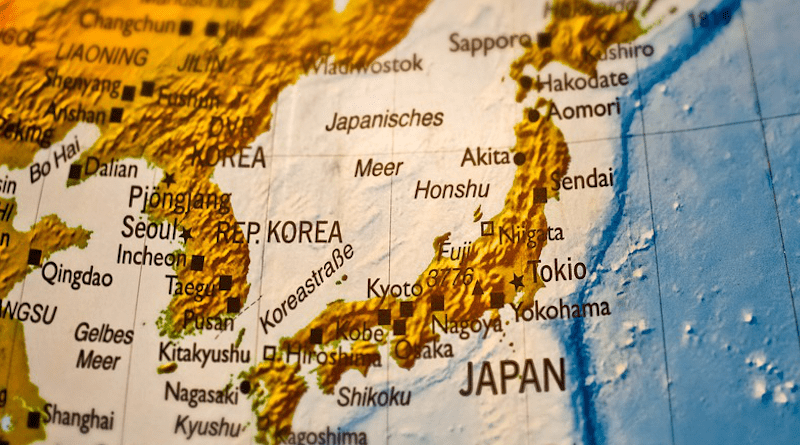Washington Cannot Force Japan And South Korea Together – Analysis
By Anthony V Rinna*
Seoul–Tokyo relations under Japan’s new prime minister Fumio Kishida are off to a less-than-promising start. This is no doubt frustrating for the United States, eager to foster reconciliation between two major Indo-Pacific partners.
Yet given the discord extends into factors beyond Washington’s control, it is possible that US efforts to induce reconciliation may end up backfiring.
It is not that US attempts at bridging the rift between Japan and South Korea are bad in and of themselves. There are a variety of factors that, given the way Washington views its alliances with the two in a broader strategic context, may necessitate the United States taking a more hands-off approach to the Japan–South Korea diplomatic row.
South Korean President Moon Jae-in was among the last of the United States’ major Indo-Pacific allies that Kishida spoke to after taking office. The lapse of time between Kishida’s calls with the leaders of the United States, Australia and India and South Korea is telling. That it took Kishida several days longer to reach his counterpart in Seoul than it took Kishida’s predecessor Yoshihide Suga also did not go unnoticed.
To make matters worse, immediately following Kishida’s belated call with Moon, Kishida sent an offering to Yasukuni Shrine, an act which drew lament from South Korea’s foreign ministry. Although his was not an in-person visit, the message is unmistakably clear — repairing ties with Seoul is not among Tokyo’s major priorities.
A consistent theme in the US approach to the Japan–South Korea row is to conduct diplomacy with Seoul and Tokyo behind closed doors so as not to appear as favouring one over the other. Joe Biden’s nominee for ambassador to Japan, Rahm Emmanuel, favours maintaining quiet efforts aimed at repairing Japan–South Korea ties. Emmanuel has attempted to strike a note of understanding on the extent that historic issues factor into Seoul–Tokyo relations, while remaining firm on Washington’s expressed interest in discouraging the past negatively affecting cooperation today.
But no amount of quiet diplomacy can change the fact that, while not inflexible, Japan and South Korea are unafraid to assert their interests. Kishida’s approach to Seoul demonstrates that Tokyo doesn’t share Washington’s need to rush into an improved relationship with South Korea. South Korea has also shown its willingness to place narrow interests above wider strategic goals, as demonstrated two years ago by Seoul’s near withdrawal from the Japan–South Korea General Security of Military Information Agreement.
Yet South Korean policymakers from Moon Jae-in’s Democratic Party have called for Seoul to take a constructive approach to ties with Japan and demonstrate Seoul’s goodwill in wishing to improve relations.
In light of the US need to balance between alliance politics and respect for state sovereignty, there are risks inherent in an overly active approach to improving Japan–South Korea ties. There is little denying that the main US interest in seeking the improvement of Japan–South Korea relations is that it will allow Washington to better fulfill its Indo-Pacific strategy. But by actively inducing Japan and South Korea into a friendlier relationship, the United States runs the risk of doing so on a timeline that doesn’t allow for a deep-rooted and genuine improvement.
South Korean Ambassador to the United States Lee Soo-hyuck has warned that Japan has grown frustrated by what it perceives as excessive interference from Washington in an attempt to push Japan and South Korea into closer embrace.
The United States already faces a delicate effort in demonstrating to South Korea that it does not favour Tokyo over Seoul. US policymakers, with the rocky period of 2002–2004 not too distant in the past, are no doubt sceptical of the extent to which they can trust a left-of-center South Korean government. This contrasts sharply with Japan, where the avowedly pro-American Liberal Democratic Party has consistently maintained power.
It is therefore easier to assume that Washington would favour Tokyo over Seoul, and there is an implicit idea that South Korea needs to ‘fall in’ with the Indo-Pacific strategy. Anything that remotely smacks of Washington favouring Tokyo over Seoul will leave an immediate bitter taste for the South Koreans.
Ultimately Seoul and Tokyo will need to come to agreement for their own sake, rather than simply because Washington wants them to.
But for all the thorniness in Japan–South Korea ties, the two countries maintain a relatively healthy collaborative relationship when it comes to handling North Korean security provocations.
Washington’s focus, therefore, should be on leveraging its shared security interests with Japan and South Korea as much as possible while allowing Seoul and Tokyo enough space to work out differences over historic issues in their own time and on their own terms.
If, however, the United States insists on trying to coax Seoul and Tokyo into an improved bilateral relationship on an artificial timeline, it does so at the risk that it could alienate one if not both allies as well as itself by being too overbearing.
*About the author: Anthony V Rinna is a senior editor for the Sino-NK research group.
Source: This article was published by East Asia Forum

